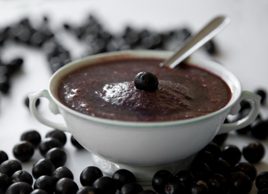5 trendy superfoods: Are they worth the cash?
Aça' berries, goji berries, coconut oil, maca and chia seeds are making headlines for their superfood status’but are they really all they’re made out to be? Here’s what you need to know

Source: Web exclusive: September 2010
Every month, it seems, some edible nut, seed or fruit is plucked from obscurity and made over into a debutante superfood. We talked to Edie Shaw-Ewald, Nova Scotia’s Nutrition Coach, about foods that have made headlines and whether they’re worth the money and effort to add them to your diet.
1. Aça' berries
These purplish berries from South America are advertised as miracle weight-loss agents, among other things. "They’re supposed to be a supplement for detoxification, lowering cholesterol, and the risk of cardiovascular disease and cancer, but these claims aren’t substantiated," says Shaw-Ewald.
Aça' is high in antioxidants, and that’s why food companies are adding it to everything from beverages to cereal. Buyer beware’studies show that the antioxidants degrade quickly after the berries are picked from the aça' palm.
Instead of shelling out for pricey aça', choose other foods that are rich in antioxidants, more readily available in Canada and much less expensive, such as Concord grapes, blackberries and blueberries.
Shaw-Ewald adds that, in general, when headlining foods such as aça' are mixed into highly processed products that may have a lot of fat, sugar and salt, this "will likely counteract any positive effects of any hyped-up food that’s new to us coming from Peru or Malaysia."
2. Goji berries
Goji berries, long eaten in China and now sold in North America in dried and juice forms, are said to improve well-being, slow aging and prevent cancer. "It’s become very popular due to marketing strategies," says Shaw-Ewald, noting that there is little evidence to support advertisers’ claims.
A study published in the Journal of Complementary and Alternative Medicine found that people who drank goji juice reported having more energy, improved focus, feelings of well-being and better gastrointestinal function; however, the goji-drinking group numbered only 16 people, and the study lasted just two weeks. An article in Planta Medica, a journal about medicinal plants, states that goji merits further investigation, but rigorous procedures for quality control must first be established. Meanwhile, the Mayo Clinic in Boston advises against investing in goji juice as a cure for cancer or any other disease.
Bottom line? Eat goji berries if you enjoy them, but don’t expect them to overhaul your health.
3. Maca
This supplement is derived from the root of the maca plant, grown at high altitudes in Peru. It is said to improve sexual function in both sexes, but "trials are limited and further research is required," says Shaw-Ewald. "Randomized clinical trials showed it may improve mood, energy, sexual desire and sperm production, but they don’t know why."
Some retailers also promote maca for post-exercise recovery and adrenal-gland support. It doesn’t hurt to try it (except for the pain your pocketbook will feel’maca tends to be pricey), but the jury is still out on whether it’s effective.
Some women consume maca to ease the symptoms of menopause, adds Shaw-Ewald, who says she is intrigued and will research the plant further. "Anything that [provides benefits for] middle-aged men and women naturally…is worth looking into."
4. Chia seeds
Chia seeds are promoted for decreasing blood pressure, improving cardiovascular health and helping with weight loss.
A study at St. Michael’s Hospital in Toronto found that they helped control blood sugar; Shaw-Ewald says this is probably due to their fibre content, which slows down absorption of glucose after a meal. The hospital also found chia seeds helpful in reducing the risk of cardiovascular disease.
More studies are required, says Shaw-Ewald. “Chia seeds are high in fibre and they do have protein, so it is a healthy food. But don’t get stuck on insisting you have chia every day. Just include a variety of nuts and seeds daily’in small amounts, because of the high calorie content.”
5. Coconut oil
“Coconut oil is very controversial. In general, it’s felt we should reduce our saturated fat intake, which raises the ‘bad’ cholesterol, and coconut oil is saturated fat," says Shaw-Ewald. "You also have to be careful’you might see coconut oil on an ingredient list, but it won’t be virgin coconut oil, which is the one that is supposed to be better and have an anti-inflammatory effect.”
Should you use coconut oil? That depends on what oil you’re replacing. “Are you using coconut oil instead of extra-virgin olive oil, which has been better proven to be healthy, or are you replacing shortening, which has a lot of trans fat?” says Shaw-Ewald. She recommends avoiding processed and partially hydrogenated coconut oil’used in snack foods because they’re so stable’altogether, because they contain trans fats. Instead, look for virgin coconut oil that has been minimally processed.
Don’t miss out! Sign up for our free weekly newsletters and get nutritious recipes, healthy weight-loss tips, easy ways to stay in shape and all the health news you need, delivered straight to your inbox.




